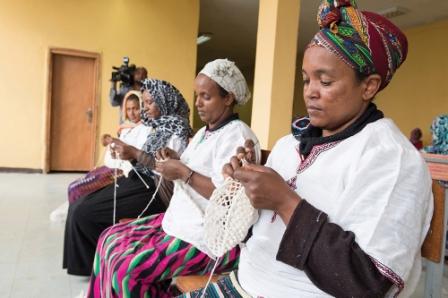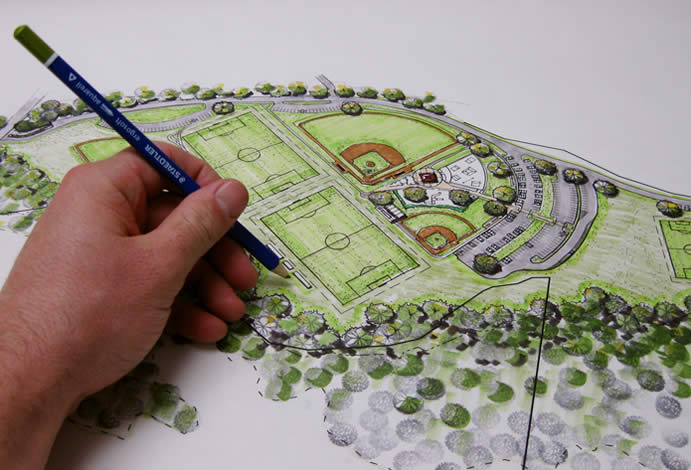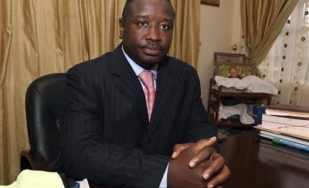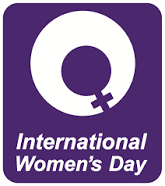Closing Africa’s ‘elusive’ gender gap
Architects at the drawing board of the Millennium Development Goals (MDGs) identified gender equality and women’s empowerment as key to achieving all the other goals. Six out of the eight MDGs mentioned women and girls as priority targets. (Photo: Ethiopian women in a skills training workshop. Photo: UN/Eskinder Debebe)
The third MDG was designed to promoting gender equality and empowering women by eliminating gender disparities in primary and secondary education; by increasing the number of seats held by women in national parliaments; and by raising the number of women in formal employment in non-agricultural sectors by 2015.
In fulfillment of this goal, Africa came close to attaining gender parity in primary level education, with the ratio of girls to boys enrolled in primary school improving in many countries. A girl born in Africa today has a better chance of finishing primary school, going to university, getting a job or becoming a member of parliament than her grandmother had. Yet gender parity on the continent is still far from sight.
“Progress on gender equality has been unacceptably slow and uneven,” Phumzile Mlambo-Ngcuka, the executive director of UN Women told Africa Renewal in an interview. “Widespread and persistent gender inequalities are holding back progress for all,” she noted.
Countries have been making strenuous efforts to address these inequalities. By the end of 2015, UN Development Programme (UNDP) projects that 18 African countries will have achieved gender parity in primary level education. “Four countries — Guinea, Benin, Guinea-Bissau and Chad — made an astonishing improvement between 1990 and 2011 (70 to 86.9%),” says UNDP’s MDG report. Countries that performed poorly were Malawi, Mauritania and Senegal.
Political participation
On women’s political participation, even though Africa could boast of one country with the highest number of female members in parliament globally (Rwanda with 64%) in 2015, the continent also had the most countries with the least number of women in parliament. For example, women in Comoros, Congo, Egypt, Gambia and Nigeria still have national parliaments made up of less than 9% women, according to the report. In 1990, only 3% of parliamentary seats in sub-Saharan Africa were held by women and by August 2015 the numbers had increased to 23%.
Hope prevails though that Africa is making steadier progress than other regions in increasing the proportion of seats held by women in national parliament, but much still needs to be done to bridge the gender gap in secondary and tertiary levels of education. By 2013, only 12 African countries had achieved parity in secondary education enrollment.
In eight countries — Angola, Benin, Central African Republic, Chad, Democratic Republic of Congo, Guinea, Niger and Togo — the gender parity index, which is used to measure the ratio of girls to boys in school, is still lower than 0.7, meaning there are fewer than seven girls to every ten boys in secondary school.
Nine countries — Algeria, Botswana, Cape Verde, Lesotho, Namibia, Rwanda, Sao Tome and Principe, Seychelles and South Africa — had surpassed the target parity level of 1.03, says the UNDP report.
On wage disparity, although the number of women in non-agricultural employment in Africa rose modestly from 35% to 39% between 1990 and 2011, women continue to earn much less than their male counterparts. Only in Benin, Botswana, Burundi, Egypt, Gambia, Ghana, Malawi, Uganda and Zambia do women earn 75% or more of men’s wages for doing similar jobs. In Algeria, Côte d’Ivoire and Mauritania, women earn less than 60% of what men earn.
To achieve full gender parity in Africa, countries need to address structural barriers that discriminate against women and girls in accessing education, employment and finance, as well as restrictions on the right of women to use or own land. Early marriages, female genital mutilation and violence against women are some of the cultural impediments that hold back progress on the gender front in Africa today.
By Zipporah Musau Courtesy of Africa Renewal
Stay with Sierra Express Media, for your trusted place in news!
© 2016, https:. All rights reserved.






